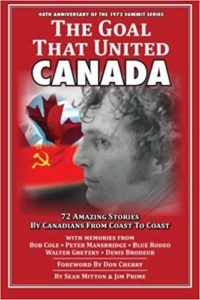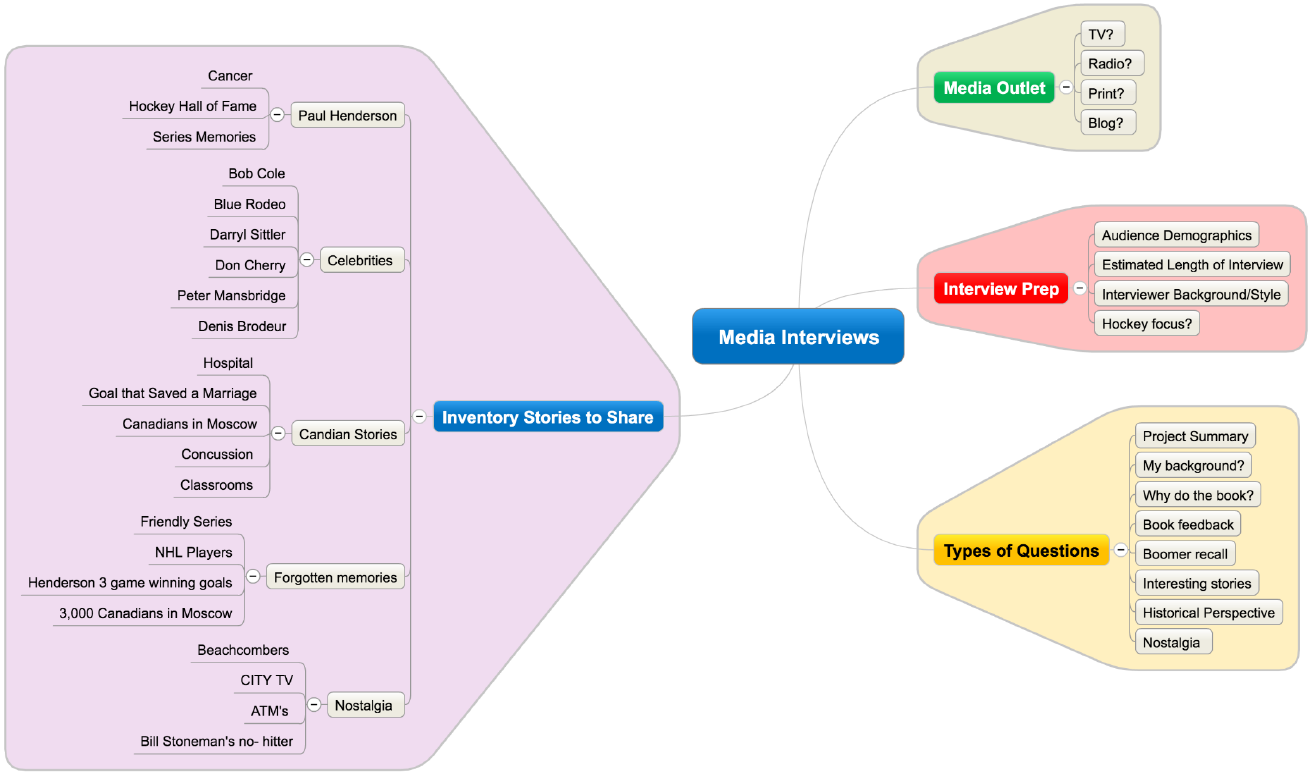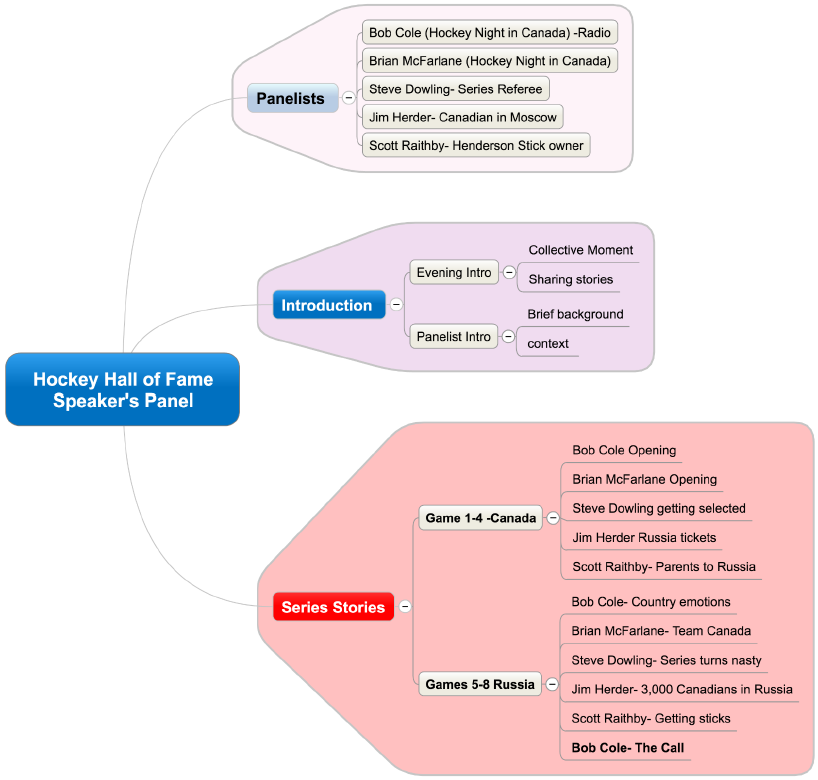This is the fifth and final post in the series How to write a book using mind maps. These posts feature the story of how Sean Mitton accomplished his ambitious goal of writing his first book, The Goal That United Canada.
You can find links to the first four articles below.
 Guest Blogger: Sean Mitton
Guest Blogger: Sean Mitton
For the the fifth and final blog post of this series, in which I discuss how I used MindManager to help author my book “ The Goal That United Canada”, I’ll be discussing how I used mind mapping for my media tour and book launch speaker’s panel at the Hockey Hall of Fame in Toronto. This occurred on the 40th Anniversary of Paul Henderson’s famous goal during the ’72 Summit Series.
As a recap on how I used mind maps throughout the project, you can revisit the following MindManager Blog posts:
- How to write a book using mind maps: Part 1
- How to write a book using mind maps: Part 2 – The strategy
- How to write a book using mind maps: Part 3 – Project management
- How to write a book using mind maps: Part 4 – Collecting stories and planning the book experience
First, let’s talk about how MindManager helped me plan and prepare for the media book tour.
Media tour interview preparation
Most people have been an interviewer or interviewee at some point in their lives. Possibly a media interview, but most likely a job interview. I wonder how many of you have considered preparing those interviews using mind maps. If you haven’t then here’s an overview of how and why this can be an effective method for interview prep.
I find that if you are more prepared, you are more confident. This ultimately will give you a better outcome. Preparation is key to success, as many people would say.
For my book launch, I was interviewed by over 20 different media outlets. They were very diverse platforms ranging from TV and radio to print and blogging. I was fortunate to be interviewed by the CBC National, Breakfast TV, Siirus XM NHL Home Ice and Post Media to name a few. All of these shows have large, national audiences across Canada.
To prepare for these interviews, I created a Media Interview mind map template that helped me prepare for many different scenarios. Because of this, there wasn’t a single question that caught me off guard during any given interview. My mind map template and content helped me navigate through a diverse set of questions with confidence.
To illustrate, the key branches that I included on my Media Tour mind map included:
- Type of media;
- Audience;
- Estimated length of interview;
- Types of questions;
- Project/book summary; and
- Story examples.
Here what my mind map looked like.

I’ve used this type of template for other media interviews in the past, as well as interviews that I’ve conducted. Organizing interview questions, scenarios and topics into a visual mind map like this is, I think, the most effective way to prepare for any given conversation. You can even apply this concept to job interviews!
Hockey Hall of Fame speaker’s panel
I’ve always believed that mind maps could help with improving memory recall. For the the launch of this book at the Hockey Hall of Fame in Toronto, I was put on the spot unexpectedly, which forced me to put this theory to the test. I’ll share more about that later, but first I want to share how I used mind mapping to prepare for a live, high profile speaking engagement.
A speaker’s panel is little different than a presentation in that it’s much more interactive. When preparing for any presentation I think about the audience, the content I’ll need to provide, what the audience will recall after the presentation and the overall flow of the talk.
 I had five unique speakers for this panel:
I had five unique speakers for this panel:
- Bob Cole, a legendary colour commentator for Hockey Night in Canada, and the announcer who called Henderson’s famous goal on CBC Radio,
- Brian McFarlane, a longtime broadcaster for Hockey Night in Canada,
- Steve Dowling, a referee from the series,
- A Canadian gentleman who attended the Summit Series in Russia, and
- A son who was given the hockey stick from the game winning goal.
In terms of feel, I wanted it to be like five guys conversing at a bar, intertwining their stories from the memorable eight game series. I wanted the peak moment in the evening to occur as the audience heard the call of the goal from Bob Cole, which he hadn’t heard in a long time. Thank to solid preparation, the panel went very smoothly and delivered the impact that we were all hoping for.
Now, back to the story of how I was put to the memory test, and how mind maps helped bail me out.
In preparing for the panel, I was going to create a number of cue cards to remember all the questions that I would ask my panelists over the one hour presentation. I had allocated time earlier in the evening to write them down but, unfortunately, it was interrupted by an unplanned media interview. I was tasked with going through the presentation without any notes; just my recollection of the mind map I created.
Fortunately, I could visualize the mind map branches in my head, and had no problems recalling the questions and order. To say that I tested (and proved) my theory of mind maps helping with memory recall in a high pressure situation is an understatement. I truly believe that the visual way that mind maps help organize information is invaluable to organizing your thoughts, and remembering when you need them most.
Concluding the series
In closing, this was a project and book of a lifetime for me. I know that I couldn’t have accomplished this without using mind maps. MindManager is such a great and easy to use platform, which helped me plan, create, organize and recall throughout the entire book writing and promotion process. I hope this series has given you some insight into how you can use mind maps to write a book, and how they can aid in every step of this journey.
About Sean Mitton
In the past 15 years, Sean Mitton has created over 700 mind maps as an Entrepreneur, Author, Speaker, Reporter, Web designer and Coach. He Founded the Canadian Expat Network, co-authored the book “The Goal That United Canada”, has been interviewed by over 30 media outlets and has interviewed notable athletes, entertainers, politicians and business leaders. He’s spoken at universities, community college conference, libraries and the Hockey Hall of Fame. In 2010, he organized the first Terry Fox Run for Cancer Research in North Carolina. Every step of the way, he’s created mind maps to keep organized, be more creative, strategic and simplify ideas. Throughout this process, he has found that by asking better questions through mind mapping, you can achieve better results!

